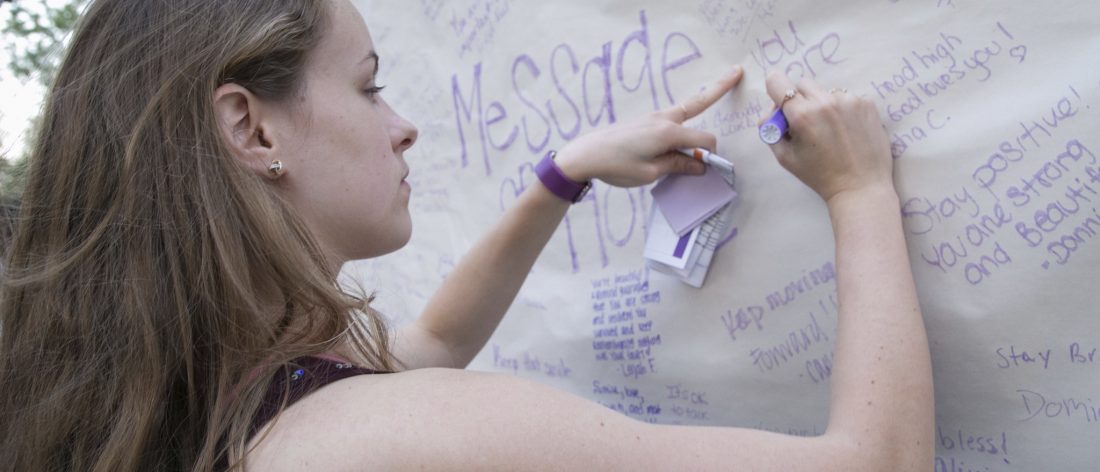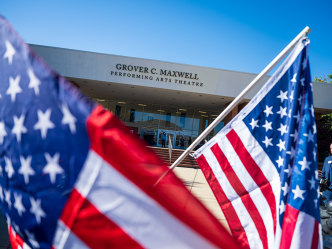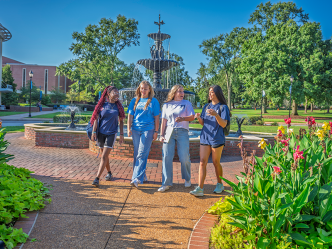Every year, there are 12 million reported cases of domestic violence. That’s 20,000 phone calls a day and 24 people per minute who report cases. One in four women and one in nine men will be a victim of domestic violence.
Title IX office at AU
Julie Kneuker is the Title IX coordinator for Augusta University and said a more accurate term to describe domestic violence is actually “intimate partner violence,” which includes dating violence. The number of reported Augusta University cases is about 20 a year, but this average only includes cases where both parties are affiliated with the university. However, that doesn’t mean the Title IX office won’t do anything about other cases.
“If we get a notice that a student has shared with their professor they’re in a difficult situation and relationship, and they report it to us or the CARE Team, we can reach out to the student or employee and provide them resources,” said Kneuker. “At the very least we want to provide them with our community resource partner, which is SafeHomes of Augusta. We want to give them the opportunity to report to law enforcement, and also provide them with resources on campus, like Student Counseling and Psychological Services.”
While many associate intimate partner violence with physical violence, it’s much more than that. The common thread is abusers try to gain and maintain power and control over the victim by any means necessary, whether physically or psychologically.
“The age group 18 to 24 is the most at-risk age group of intimate partner violence. There’s freedom young people are experimenting with, being away from home for the first time combined with a lack of experience, which creates the increased risk,” said Kneuker.
Title IX departments at schools nationwide were created to assure equal access to education and activities for all students and employees. It’s a scope that goes well beyond dealing with intimate partner violence.
During Domestic Violence Awareness Month, the Title IX office has held workshops and seminars focusing on healthy relationships. Because more often than not, it’s a friend or family member who makes the first call to police or their office.
“Bystander awareness and intervention is key to everything dating violence, and sexual violence,” said Kneuker.
Finding causes and solutions
Dr. Allison Foley is an associate professor at Pamplin College of Arts, Humanities, and Social Sciences. Foley teaches both undergraduate and graduate classes on gender and victimization and intimate partner violence, and said the goals are understanding the cause and exploring potential solutions in intimate partner violence.
“The idea for our Master of Public Administration students is for them to be able to identify those programs and policies that have been implemented to deal with the issue and really get a sense of what the research says about those and then be able to offer practical solutions,” said Foley.
One big factor of intimate violence is the past history of the abuser — but there are others.
“Attitudes about violence and attitudes about women and gender roles increase the likelihood of intimate partner violence. Also, low education plays a role,” said Foley.
Foley added there has been a shift into distinguishing abusive behaviors and relationships from unhealthy relationships and behaviors.
“I think this has been kind of an outgrowth of doing outreach with youth. Youth will talk about the controlling tactics that the people they’re dating utilize, and they themselves utilize, but doesn’t necessarily describe violence.
“When people recognize something’s unhealthy, it’s maybe a bit easier to conceive of getting healthy again,” said Foley.
A big component of her classes has been service projects, including hosting events on campus and going into the community. Her students have already signed up for another Days of Service project with SafeHomes.
“In the past, my students have all participated in SafeHomes volunteer training. Then they were allowed to actually be on-site at SafeHomes, be in contact with clients there potentially. So in the past we’ve gone down to their facilities and done volunteer work for them and meet whatever needs they had going on at the time.”
Additionally, one of the main goals of Chelsea Paulding, the new Miss Augusta University, is to promote her social impact initiative: advocating against domestic violence.
“As a teen that experienced teen dating violence through emotional abuse and certain things like stalking, and had friends who have experienced domestic violence, it just really resonated in my heart to advocate and push things forward,” said Paulding.
“So recognizing the signs and collecting the resources for providing things for victims is the best way I can really make my impact and really make a difference in communities in and around Georgia.”
 Augusta University
Augusta University




